|
|
|
Sort Order |
|
|
|
Items / Page
|
|
|
|
|
|
|
| Srl | Item |
| 1 |
ID:
065562
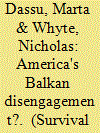

|
|
|
| 2 |
ID:
098357
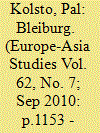

|
|
|
|
|
| Publication |
2010.
|
| Summary/Abstract |
In a study of historical myths in South Eastern Europe in 2005 I identified four different types of mythologies, one of which was the myth of martyrdom (Kolsto 2005). I pointed out that while nations most of the time celebrate their victories and moments of glory, occasionally their great tragedies and defeats are also embellished into mythical stories and made into objects of collective commemoration. As a prime example of mythologised defeats in the history of the Balkan peoples I-like many other authors-singled out the battle of Kosovo in 1389, an event which in contemporary Serbian consciousness has come to be regarded as the moment when the Serb nation chose righteousness and truth over earthly power (Vuchinich & Emmert 1991; Anzulovic 1999, pp. 11-22; Judah 2000).
|
|
|
|
|
|
|
|
|
|
|
|
|
|
|
|
| 3 |
ID:
123224
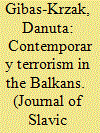

|
|
|
|
|
| Publication |
2013.
|
| Summary/Abstract |
The aim of this article is to examine the terrorism in the Balkans. Contemporary Islamic terrorism in the Balkans is caused by the increase of influences of Muslim fundamentalists, especially in Bosnia and Herzegovina. The origins of Islamic terrorism are connected with radical trend of this religion, which became popular in the society in the period of socialist Yugoslavia. However, this trend could be widespread on a larger scale only when Mujahideen came to Bosnia and Herzegovina to take part in the civil war. In Bosnia and Herzegovina, it was the religious fanatics who mainly participated in the fighting. Many of them were the members of terroristic organizations, such as Al-Qaeda, Hezbollah, Hamas, and Al-Gama'a al-Islamiyya. A considerable number of 'Warriors of Allah' remained on the territory of Bosnia and Herzegovina after the end of the civil war, thus, contributing to the development of the terrorist network connected with radical factions of Islam. The author emphasizes that is essential to take complex actions that aim to fight this threat by international cooperation of special services and the police as a part of the European Union (UE) mission. It is even more important since West Balkans actively participate in the UE and North Atlantic Treaty Organization (NATO) integration processes.
|
|
|
|
|
|
|
|
|
|
|
|
|
|
|
|
| 4 |
ID:
119863
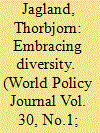

|
|
|
|
|
| Publication |
2013.
|
| Summary/Abstract |
Strasbourg, France-Any attempt to explain a transnational identity must take into account that nations, cultures, and people have always met and mixed across borders and boundaries. Europe's historically grounded diversity constitutes our true identity and gives us great strength if properly understood and respected. Over the centuries, nations have been born, and borders created or modified. The most recent wave of border changes occurred after the fall of communism. While some changes proved violent, such as war in the Balkans after the disintegration of Yugoslavia, others were peaceful. Czechoslovakia split, without conflict, into the Czech Republic and Slovakia.
|
|
|
|
|
|
|
|
|
|
|
|
|
|
|
|
| 5 |
ID:
108206
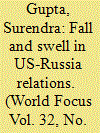

|
|
|
| 6 |
ID:
085310
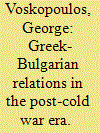

|
|
|
|
|
| Publication |
2008.
|
| Summary/Abstract |
The Balkan Peninsula has been an unstable regional security subsystem because of a number of defining and qualitative parameters, namely, overt or covert challenges to the territorial status, interethnic conflicts, the "great idea" syndrome, out-of-system interference, and minority expansionism. In the post-Cold War era, European Union enlargement in the area assisted the establishment of a core of systemic stabilizers that could, under certain conditions, absorb inherent instability. Greece and Bulgaria constitute an axis providing eufunctional input to the regional stability and security equation. Their partnership has been an example of inter-Balkan cooperation and an effort to establish an equilibrium mechanism to enhance the cohesion of the region
|
|
|
|
|
|
|
|
|
|
|
|
|
|
|
|
| 7 |
ID:
090978
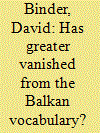

|
|
|
|
|
| Publication |
2009.
|
| Summary/Abstract |
Talk of a "greater" this or that Balkan nation-state has subsided in recent years as the region experienced the creation of ever more minirepublics-a total of eight on the territory of former Yugoslavia. This trend toward fragmentation was initiated by petty nationalists and fostered by the United States and European powers that found it convenient and desirable to dominate and exploit a bunch of fiefdoms. The outside powers reinforced the new system of minirepublics by inviting candidacy in their continental economic organization, the European Union, and their now global security organization, the North Atlantic Treaty Organization. But is "greater" gone forever from the Balkan vocabulary? It might be prudent not to banish the concept. Think of the phrase of the late Willy Brandt spoken in 1989: "Jetzt wächst zusammen was zusammen gehört"-"Now grows together what belongs together." Applied to the Balkans in coming decades the ethnic Albanians now living in at least five Balkan states and the ethnic Serbs living in five states, as well, are developing growing kinship with their fellow nationals beyond the current frontiers and local allegiances that currently separate them.
|
|
|
|
|
|
|
|
|
|
|
|
|
|
|
|
| 8 |
ID:
124255
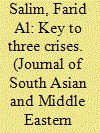

|
|
|
|
|
| Publication |
2013.
|
| Summary/Abstract |
Palestine occupied an exceptional place in German strategic thinking long before Hitler's rise to power, indeed before his birth. Ashkenazi Jews from Germany and Poland established a small religious community in Jerusalem around 1800. They lived in abject poverty, supported by contributions from fellow Jews in Europe, and devoted all of their time to religious study.
|
|
|
|
|
|
|
|
|
|
|
|
|
|
|
|
| 9 |
ID:
120468
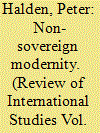

|
|
|
|
|
| Publication |
2013.
|
| Summary/Abstract |
Social theory almost invariably equates modernity with the sovereign state. This equation must be nuanced because the modern era and modern strategies of international stability have contained non-sovereign units. In the nineteenth century, the Great Powers tried to create international stability by engineering forms of rule in Europe. These strategies built on distinctively modern ideas: the possibility of radically breaking with the past, redesigning political organisations, and actively controlling political events through rational planning. Throughout the century the Great Powers alternated between creating non-sovereign units and creating sovereign units as instruments in these stabilising strategies. The degree of trust between the Great Powers accounts for the shift between the two strategies: they tended to create non-sovereign units when mutual trust was high and sovereign ones when trust was low. This article analyses Great Power strategies of designing forms of rule in the Balkans between 1820 and 1878. Like in previous centuries, nineteenth-century Europe actually consisted of two parallel but connected systems: the egalitarian system of sovereign states and a system of non-sovereign entities. Non-sovereign units disappeared only late in the century and this process was affected by the increasing rivalry and mistrust between the sovereign states.
|
|
|
|
|
|
|
|
|
|
|
|
|
|
|
|
| 10 |
ID:
031494
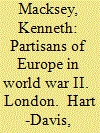

|
|
|
|
|
| Publication |
London, Hart-Davis, Macgibbon Ltd, 1975.
|
| Description |
271p.: ill., maps.Hbk
|
| Standard Number |
0246105747
|
|
|
|
|
|
|
|
|
|
|
|
Copies: C:1/I:0,R:0,Q:0
Circulation
| Accession# | Call# | Current Location | Status | Policy | Location |
| 024853 | 940.55/MAC 024853 | Main | On Shelf | General | |
|
|
|
|
| 11 |
ID:
112490
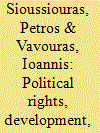

|
|
|
|
|
| Publication |
2012.
|
| Summary/Abstract |
This essay provides an account of the phenomenon of corruption in the Balkan and Arab countries of the Mediterranean. The analysis focuses on the effects that the political system-approached through the lens of political rights-and the level of economic development have on corruption. These factors are of critical importance for analyzing the scale of corruption in the region and should form the core of any anticorruption strategies.
|
|
|
|
|
|
|
|
|
|
|
|
|
|
|
|
| 12 |
ID:
120904
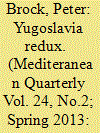

|
|
|
|
|
| Publication |
2013.
|
| Summary/Abstract |
Despite the dreadful wars-and the comparable horrors of uncertain "peace"-and against the background of an almost religious knack for recurring Balkan catastrophe, there are warnings that hostilities are reviving in the former Yugoslav republics of Serbia, Croatia, and Bosnia and their substates. Kosovo has redeclared its "independence" for the second time in four years. Ethnic Hungarians are stretching their "autonomy" and prodding for secession in Vojvodina-or will it be "Vojvodinia?"-as former UN peacekeepers (among others) deal with cancer caused by depleted uranium in the former killing fields. Inner migration of hundreds of thousands of displaced persons temporarily plugged holes in Serbia's negative population growth in the midst of a continuous exodus to Europe and anywhere else. Numerous signs point to the potential for renewed and ongoing difficulties in this most difficult of regions. This essay provides an overview of the gathering clouds.
|
|
|
|
|
|
|
|
|
|
|
|
|
|
|
|
|
|
|
|
|